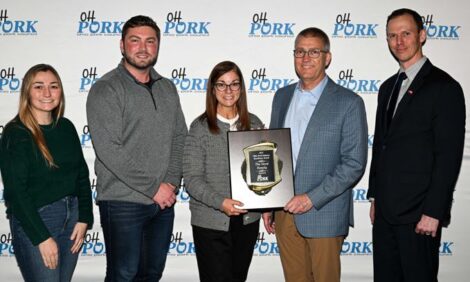



Evaluation of Diet Complexity and Benzoic Acid on Growth Performance of Nursery Pigs
Early nursery pig growth performance was adversely affected when the pigs were fed simple diets (without lactose, zinc oxide or speciality protein sources) but benzoic acid had no effects on pig performance, according to new research at Kansas State University.
At the 2013 Kansas State University Swine Industry Day, J.E. Nemechek presented the results of an experiment to evaluate weaner diet complexity and benzoic acid on the growth performance of nursery pigs.
Three days after weaning at around 21 days of age, a total of 280 weanling pigs (PIC 327 × 1050, initially weighing 15.4 lb) were used in a 28-day trial to evaluate the effects of benzoic acid and diet complexity on growth performance.
Treatments were arranged as a 2×2 factorial with two diet complexities and two benzoic acid levels (Vevovitall; DSM Nutritional Products; 0 versus 0.5 per cent) fed for the first 14 days. Diet complexity treatments were either a simple diet that did not contain any lactose, zinc oxide or specialty protein sources or a complex diet that contained 10 per cent dried whey, 1.25 per cent select menhaden fishmeal, 1.25 per cent spray-dried blood cells and 0.25 per cent zinc oxide.
From days 14 to 28, pigs were fed a common diet with and without 0.5 per cent benzoic acid, with pigs continuing to receive benzoic acid if they received it from days 0 to 14.
No growth performance interactions (P>0.33) were detected between diet complexity and benzoic acid.
From days 0 to 14, when different diet complexities were fed, pigs fed simple diets had decreased (P<0.001) average daily gain and average daily feed intake and poorer (P<0.001) feed:gain ratio than pigs fed complex diets.
From days 14 to 28, pigs previously fed simple diets showed compensatory growth and tended to have increased (P<0.06) average daily gain and improved (P<0.003) feed:gain ratio than pigs previously fed the complex diets.
Overall (days 0 to 28), pigs fed simple diets during Phase 1 had decreased (P<0.001) average daily gain and average daily feed intake than those fed complex diets. For the main effect of benzoic acid, no differences (P>0.10) were observed in average daily gain, average daily feed intake or feed:gain ratio.
In conclusion, as expected, early nursery pig growth performance was reduced when pigs were fed simple diets, concluded Nemechek and colleagues, while benzoic acid had no impact on pig growth performance, regardless of diet complexity.
Reference
Nemechek J.E. M.D. Tokach, S.S. Dritz, R.D. Goodband, J.M. DeRouchey and J.R. Bergstrom. 2013. Evaluation of diet complexity and benzoic acid on growth performance of nursery pigs. Proceedings of 2013 Kansas Swine Day, p35-41.
Further Reading
You can view the full paper by clicking here.
Read other papers presented at the 2013 Kansas Swine Day by clicking here.
January 2014






